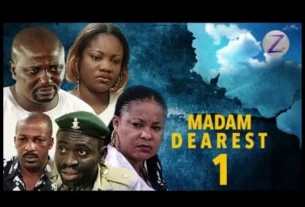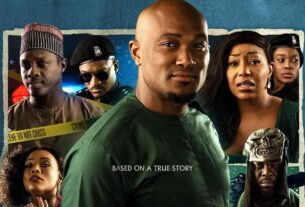There’s something special about discovering a film that reveals new layers each time you watch it. While Hollywood gets most of the attention for rewatchable classics, Nollywood has quietly produced some incredible movies that deserve multiple viewings. These aren’t just good films but they’re the kind that make you notice something different every single time.
Here are five Nollywood gems that prove great storytelling transcends borders and budgets;
1. October 1
Kunle Afolayan’s period thriller set in 1960s ,Nigeria is a masterclass in atmosphere and storytelling. Sadiq Daba delivers a compelling performance as a police officer investigating mysterious murders in a colonial-era town, but the real star is Afolayan’s meticulous attention to historical detail.
Your first time watching, you’re genuinely on edge trying to solve the murders alongside Inspector Danladi . The period setting is so immersive that you’re transported to 1960s colonial Nigeria, caught up in the investigation and the beautiful cinematography that makes every frame look like a vintage photograph.
The second viewing is when the real magic happens. With the mystery solved, you can focus on the incredible historical storytelling. You start catching references to real political movements, noticing how the costume design reflects different social classes and ethnic groups, and appreciating how Afolayan uses the murder mystery as a vehicle to explore the tensions leading up to independence. The killer’s motivation makes more sense, but so does everyone else’s behavior throughout the film.
It’s the kind of film that works as both entertainment and a history lesson, with new details emerging each time you watch.
2. King of Boys (2018)
Kemi Adetiba’s political thriller is an absolute powerhouse that demands multiple viewings. Sola Sobowale gives a career-defining performance as Eniola Salami, a businesswoman navigating the dangerous intersection of politics, crime, and power in Lagos.
First watch is overwhelming in the best way possible. You’re trying to keep up with Eniola’s web of business deals, political maneuvering, and family obligations while being absolutely mesmerized by Sola Sobowale’s commanding screen presence. The plot moves fast, the stakes feel impossibly high, and you’re just trying to figure out who can be trusted.
Second viewing is when you become a detective yourself. Now you’re watching for the subtle glances, the carefully chosen words, and the power plays happening in every scene. You see how Eniola’s past decisions created her present problems, how every character serves a specific function in the political machine, and how the film’s commentary on corruption goes deeper than you initially realized. Those boardroom scenes become chess matches where you can finally follow all the moves.
The film’s exploration of female power in a male-dominated world becomes richer with each viewing, and those intense boardroom scenes hit different when you know what everyone’s really fighting for.
3. Citation (2020)
Kunle Afolayan’s campus drama tackles sexual harassment in academia with remarkable nuance and sensitivity. Temi Otedola and Jimmy Jean-Louis anchor this story about a postgraduate student fighting against a predatory professor, but what makes this film rewatchable is how it avoids easy answers.
Your first viewing is emotionally intense, you’re invested in Moremi’s fight for justice and frustrated by the institutional barriers she faces. The film’s handling of sexual harassment feels urgent and necessary, and you’re rooting for her to expose the truth about Professor Lucien.
The second time through, you appreciate the film’s remarkable restraint and complexity. You notice how Afolayan presents multiple perspectives without excusing predatory behavior, how the supporting characters’ reactions reveal different aspects of institutional complicity, and how the film explores the personal cost of speaking truth to power. The ending feels less like resolution and more like the beginning of a longer conversation about systemic change. It’s a film that trusts its audience to think critically about complex issues, and that complexity becomes more apparent with each viewing.
4. Lionheart (2018)
Genevieve Nnaji’s directorial debut is a family business drama that works on multiple levels. Nnaji stars as a woman fighting to save her father’s transport company while dealing with family expectations and gender discrimination in business.
First viewing feels like spending time with a loving, slightly chaotic family. You’re charmed by the warm relationships, impressed by Adaeze’s determination to prove herself in the male-dominated transport business, and entertained by the culture clash when her uncle arrives from America expecting to take over.
Second viewing reveals the film’s deeper layers. You see how every family interaction reflects broader themes about gender expectations, how the business struggles mirror larger economic challenges facing Nigerian entrepreneurs, and how the film celebrates both tradition and progress without pitting them against each other. The relationship between Adaeze and her niece becomes even more touching when you understand how it represents hope for the next generation.
The film’s gentle humor and authentic family interactions create this warm, lived-in feeling that makes you want to spend more time with these characters. It’s comfort viewing that happens to tackle serious themes with grace and intelligence.
5. The Wedding Party (2016)
Kemi Adetiba’s romantic comedy hit all the right notes on its first viewing, but it’s the small character moments that make this worth revisiting. The ensemble cast, led by Adesua Etomi and Banky Wellington, creates this lived-in world of Lagos high society that feels both glamorous and authentically Nigerian.
First viewing, you’re completely swept up in the wedding day madness, the gorgeous outfits, the family drama exploding at the worst possible moments, and whether Dunni and Dozie will actually make it down the aisle. You’re laughing at the chaos and rooting for love to win.
Second time watching, You realize how much you missed while being entertained. Suddenly you’re noticing how the older generation’s conversations reveal deep-seated class tensions, how each family member’s behavior reflects different attitudes toward money and status, and how the film quietly critiques Lagos elite culture while celebrating it. The comedy hits different when you understand the social dynamics at play.
Plus, RMD and Sola Sobowale’s chemistry as the feuding parents never gets old. Their banter hits different when you know where their relationship is headed.
These five films prove that great storytelling isn’t limited by geography or budget. What they share is a commitment to authentic character development, cultural specificity, and the kind of layered storytelling that rewards careful attention.
Nollywood’s best films offer something you can’t get anywhere else, deeply rooted stories that speak to universal human experiences while celebrating the richness of Nigerian culture. Whether you’re drawn to political thrillers, family dramas, or romantic comedies, these movies prove that the most rewatchable films are often the ones that feel most real.
Which Nollywood films do you find yourself coming back to? The beauty of great cinema is how personal our connections to these stories can be. Share your favorites and what keeps drawing you back to them.



